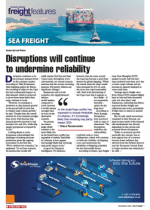SACO Shipping has successfully completed the first phase of its custom-built operational platform, SHIFT.“This is a tailored LCL system designed to address and enhance the unique demands we face as a co-loader,” said Nicholas von Flemming, national sales manager. “The platform integrates seamlessly with EDI systems, boosts client-facing efficiencies, and strengthens the connection with our ZACPAK CFS proprietary software. The results include enhanced reporting capabilities and a fresh perspective on our LCL product.”The platform was well timed to meet evolving market needs, said Beverley Brennan, Gqeberha branch manager.“We have received feedback indicating a growing trend of low stock holding, with just-in-time (JIT) cargo increasingly moving in consolidated boxes, particularly within the automotive sector,” she told Freight News. “This shift underscores the importance of structured transit times and reliable weekly services.”The changing dynamics align seamlessly with SACO’s multi-hub direct-consol strategy into Gqeberha from traditional global base ports. “There is now a clear demand to extend these efficiencies to other emerging markets into Gqeberha, a development we anticipate will take shape in 2025.”The company is continuing to closely monitor challenges related to carrier scheduling into Ngqura and Gqeberha, which have been impacted by disruptions to published carrier transit times.“Unlike our Durban hub, where delays are largely tied to port performance, the delays in Gqeberha are increasingly weather-related,” said Von Flemming. “These disruptions into all South African ports, combined with other regional delays, have led carriers to implement unexpected transhipments in an effort to uphold schedule integrity.”Adding to these concerns is the mention of Transnet’s well-known booking system, currently active in Durban, potentially being extended to Ngqura, said Brennan. “Based on our experience and feedback from others in the industry, this development is a cause for concern.”Despite challenges, Von Flemming said the overall outlook was positive. The conclusion of the reefer season has sparked discussions about enhanced carrier capacity in the months ahead. “We are excited about the anticipated improvement and the implementation of additional services into the Gqeberha market from Asia, which will complement our current direct box offerings,” he said.The neutral consolidator continues to see growth driven by the value of offering services that terminate in all three major coastal hubs. “Our diverse client base benefits from the f lexibility to choose their preferred LCL movement, leveraging our ability to meet a wide array of demands with tailored solutions,” explained Von Flemming.When asked about sea freight volumes, he highlighted the volatility in post-Covid supply chains. “Improved forecasting models have enabled importers and exporters to better navigate regional delays and routing challenges, resulting in more effective supply chain management and more agility in their supply chains based on lead time or cost issues.”This, however, had also impacted traditional patterns of volume and buying frequency, including in Gqeberha, said Brennan. “We’ve adapted our LCL product to respond swiftly to these shifts in end-user behaviour, balancing economic and supplier conditions.”Von Flemming noted that clients’ varying preferences for modal solutions had allowed SACO’s divisions to work synergistically, providing comprehensive freight forwarding solutions to a broad client base.When it comes to rates, Brennan and Von Flemming said several factors were at play. “The implementation of the FuelEU Maritime Regulation under the European Union Emissions Trading System (EU ETS) in 2025 is expected to have a significant impact on all EU-related cargo.” Carrier capacity and scheduling have also played pivotal roles in shaping decision-making processes. “Extended transit times and unscheduled routing amendments have placed pressure on our global one-stop transhipment solutions, as even feeder links face disruptions.”Looking ahead, the company remains optimistic about the sector’s trajectory. “We believe our multimodal neutral portfolio of solutions positions us perfectly to meet the evolving needs of our clients across an ever-expanding range of markets,” said von Flemming. LV

